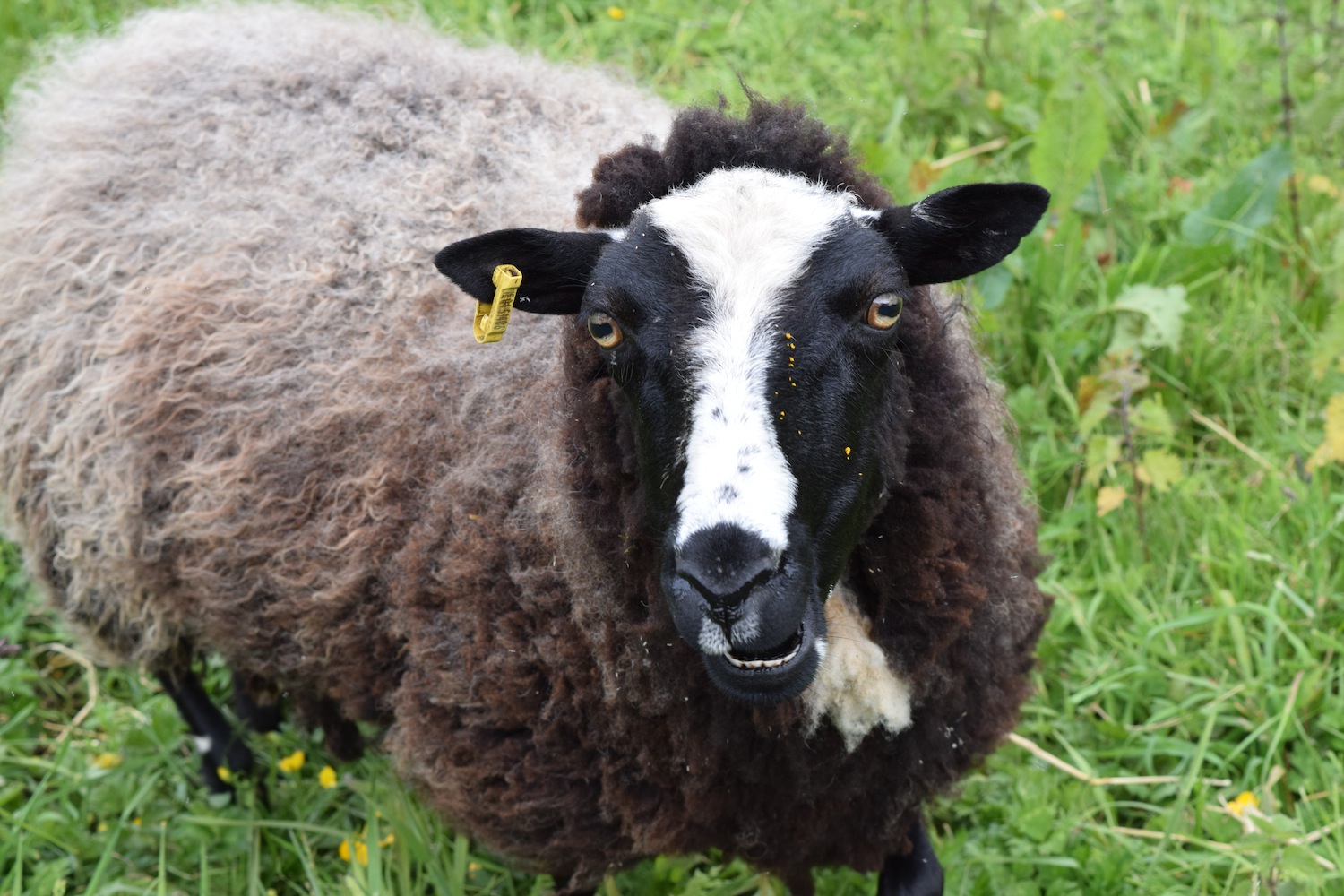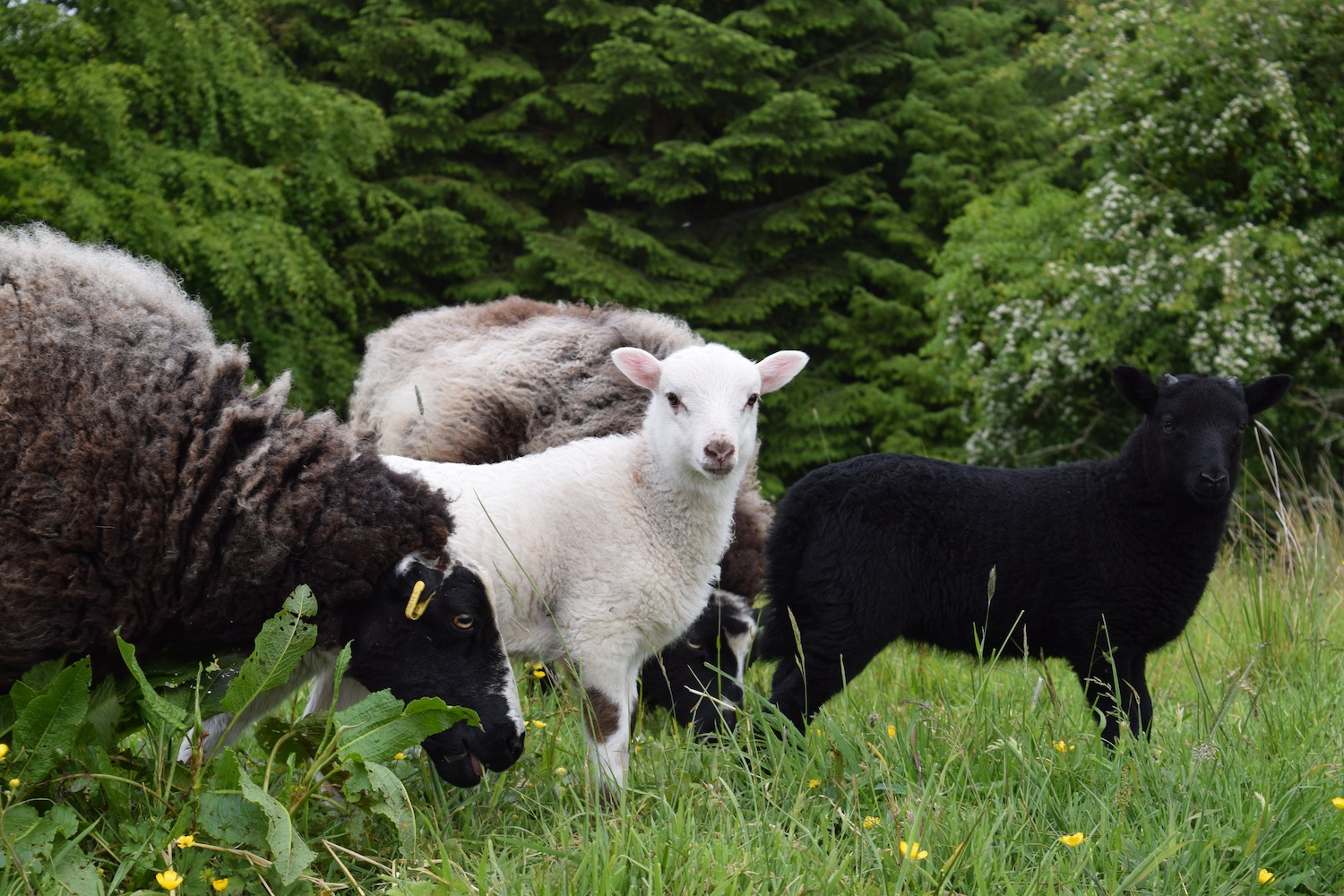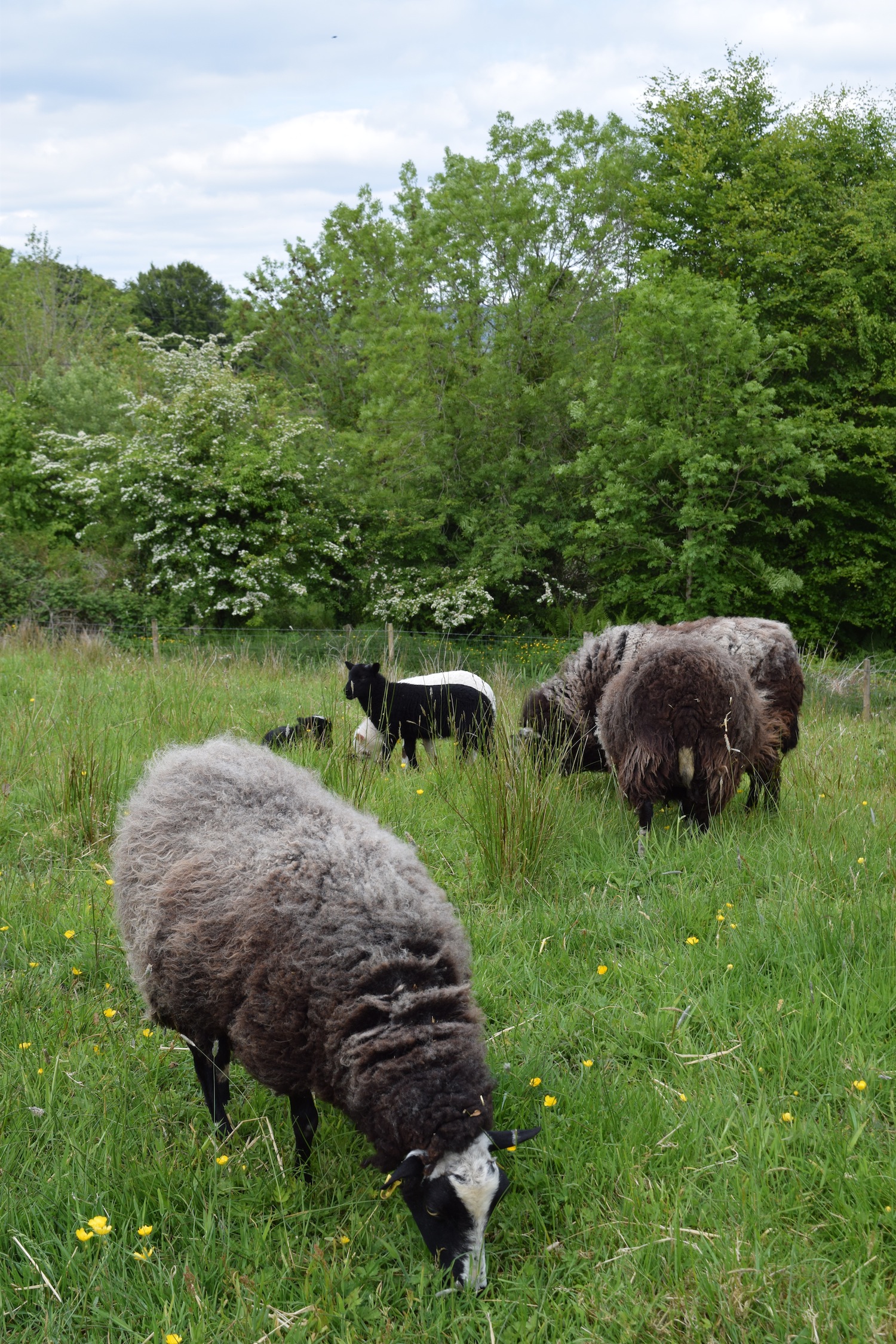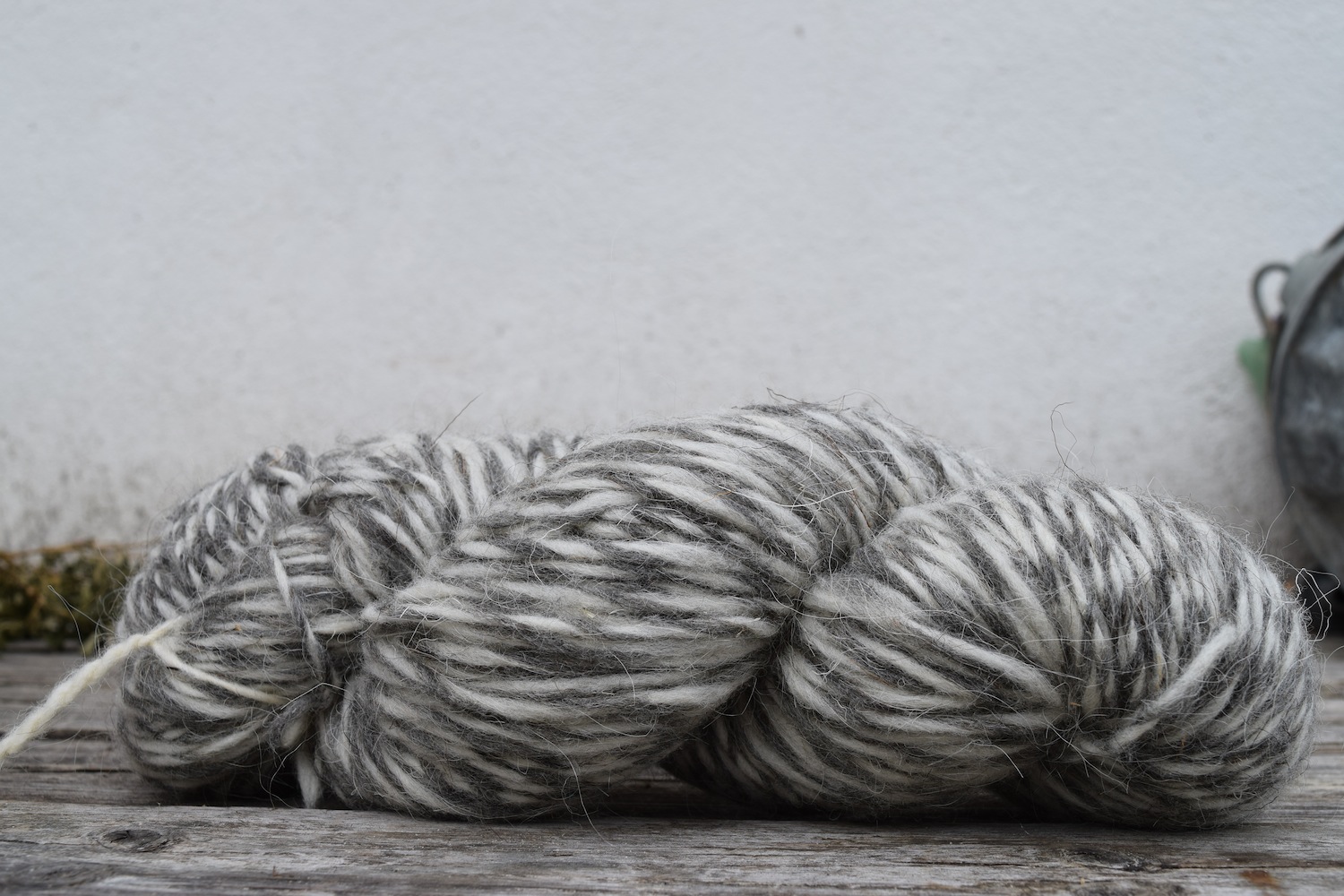As shearing approaches I am looking at several bags of fleece from last year and wondering exactly when I will have time to spin this enormous pile of wool before I am confronted with even larger bags of fleece from this year’s clip. I am dreaming of having it spun into yarn by machine, and researching the possibilities.
There is nowhere in Ireland for the small farmer to have yarn spun from fleece so it would need to be sent at least as far as the UK for processing. And it would be expensive. I am looking into selling small amounts of the spun yarn to help fund the project and wondering would the interest be there for buying it. More on that another time. (Though the excitement of having mill-spun yarn to play with is keeping me awake at night. As well as the 10 month old baby of course…)
On the subject of local yarn and yarn miles I read a post by Rebecca of Needle & Spindle (a thoughtful blog and well worth a read) about local yarn. Rebecca lives in Australia and was musing on what makes a yarn local. She mentioned some local (to her) yarn companies who send their yarn to China and back to have it spun and she was adding up the yarn miles, which were significant. It got me thinking about the yarn producers in Ireland and how difficult it is to have an entirely Irish yarn – grown and processed in Ireland.
So I decided to look into how many yarn miles go into the knitting yarns produced by the bigger Irish companies and the proportion of their wool that is sourced in Ireland. It turns out to be a very complicated affair. (All calculations below are my own rough estimates.)
There are 3 large mills in Ireland producing knitting yarn. Carol Feller has written a great article on Irish woolen mills which I would recommend reading. I don't want to repeat her info here - rather to look at the miles traveled and the sources of what we term Irish yarns.
Donegal Yarns are the largest yarn producers in the country and they make several types of yarn for knitting. When I visited the factory some years back they sourced all their wool from New Zealand and Australia, though all their wool is sourced in the UK now. It is all processed in Donegal. They have begun sourcing some wool from Wicklow Cheviot sheep in Ireland but at this stage are only producing samples with that Irish wool and not knitting yarn.
Yarn miles for all their yarns: approximately 300 miles. Amount of Irish fleece: none.
Cushendale produce three types of yarn: a knitting yarn of which 75% is Irish (from Galway sheep which are the only listed native Irish breed and have fine wool) and 25% is crossbred lamb's wool from New Zealand; a 100% Irish knitting yarn from Zwartables Sheep – a project they undertook with Suzanne Crampton of Zwartables Ireland; and a Boucle mohair yarn which is a South African mohair and Australian wool blend that is spun in the UK at the moment and dyed in Kilkenny. I talked to Philip Cushen, a man very passionate about wool, who was extolling the virtues of wool produced in our climate – its elasticity primarily – and he is trying at the moment to source lamb's wool from Galway lambs to make up the last 25% of his yarn in order to produce a wholly Irish sourced yarn. Their fleece must be sent to the UK at the moment for scouring, but otherwise all production on their wool yarns is done in Kilkenny.
Yarn miles for their standard knitting yarn: c. 12,200 miles. (This figure includes the longer journey 25% of the wool has taken from New Zealand and the much shorter journey taken by the Irish fleece.) Amount of Irish fleece: 75%.
Yarn miles for the Zwartables yarn: c. 600 miles. Amount of Irish fleece: 100%.
Yarn miles for the mohair yarn is c. 17,200 miles. Amount of Irish fleece: none.
Kerry Woollen Mills produce two types of knitting yarn. Their standard knitting yarn is a blend including Irish Galway fleece and imported wool from New Zealand. The percentages of each vary. The wool is scoured in Yorkshire, due to high environmental compliance standards making this too expensive for small scale operations here in Ireland. The rest of the processing is done in Ireland. Their organic yarn is sourced in Ireland from a range of different sheep breeds. Apart from scouring this yarn is processed here also.
Yarn miles for their standard yarn: c. 11,900 miles. (This includes yarn miles of both the New Zealand wool and the Irish wool.) Amount of Irish fleece: varying percentages.
Yarn miles for the organic yarn, c.600 miles. Amount of Irish fleece: 100%.
So of the large mills (and not all are large large - Cushendale for example has only 7 employees) that leaves us with only two yarns both sourced and almost entirely produced in Ireland - Cushendales Zwartables yarn and Kerry Woollen Mills organic yarn – only 2 colours! And because of the fact that the fleece needs to be scoured in the UK, the yarn miles for these actually ends up higher than Donegal Yarn's UK sourced yarns.
There are smaller producers in Ireland – mostly small hand-spinners selling yarn locally, but also the relatively new S Twist Wool (yarn pictured above) who produce low-impact handspun and mill-spun yarn using Irish wool. There are a few shops in Dublin stocking their yarns presently. Another woman I worked with as part of Harnessing Creativity is producing a sock kit with Irish Galway yarn - spun in the UK but wholly sourced here. (More on that when it arrives.)
As Rebecca talked about in her article – the shortest way from sheep to yarn is through your own hands – by cleaning, carding and spinning your own yarn. I am lucky enough to be someone with a very short yarn mileage – approximately 0.01 miles to my sheep from where I process my yarn. It’s a pity I cannot have it mill spun in Ireland. But even so, the UK or near Europe is not halfway across the globe.
I wish there were more options for small yarn producers in this country. All the companies mentioned make great yarn. I use and love the yarn from all of them, and I wish obtaining marketable Irish fleece was not so difficult for them. The interesting thing is that it is available - contrary to popular belief not all Irish wool is only good for carpets - but it is difficult to obtain - for example, as mentioned above, Cushendale are looking to source Galway lamb's wool from slaughterhouses to make a 100% Irish wool, but cannot get slaughterhouses to sort the wool from other breeds yet.
I'm not sure any of our Irish sheep will reach the softness required for Donegal Yarns' Soft Donegal range which is produced from Merino wool. (Though apparently Merino sheep have been kept in Ireland and were possibly used many years back to improve the Galway breed.) But at least some of the mills in Ireland are making use of the unique qualities of our fleece to produce a great product.
However I wish there were more traceability for consumers on yarn - a label of Irish knitwear does not necessarily mean the wool is grown or processed in Ireland, merely knitted into a garment here. Likewise yarn labeling can be misleading for those who do not delve deeper. The realities of the tastes of the yarn market, (favouring softer yarn) and high production costs for small companies mean the yarn miles of Irish yarn will likely always be higher than they could be.
Does it mean these yarns are local yarns? The answer is complicated. And what is most important to you as a yarn buyer? Locally sourced raw materials? Local production of the end product? Yarn miles? Local employment? Animal welfare? Fair trade? Environmental impact?
These are all important to me. And the longer I live on this planet, the more important it feels to tread lightly on it. To make conscious choices over the yarn I buy for my hobby feels important - which is part of the reason I now have sheep. (Unfortunately having my own source of yarn outside my door has not stopped my yarn-acquiring habit!) I would like to know the impact that the choices I make have. I just wish it wasn't so complicated.








